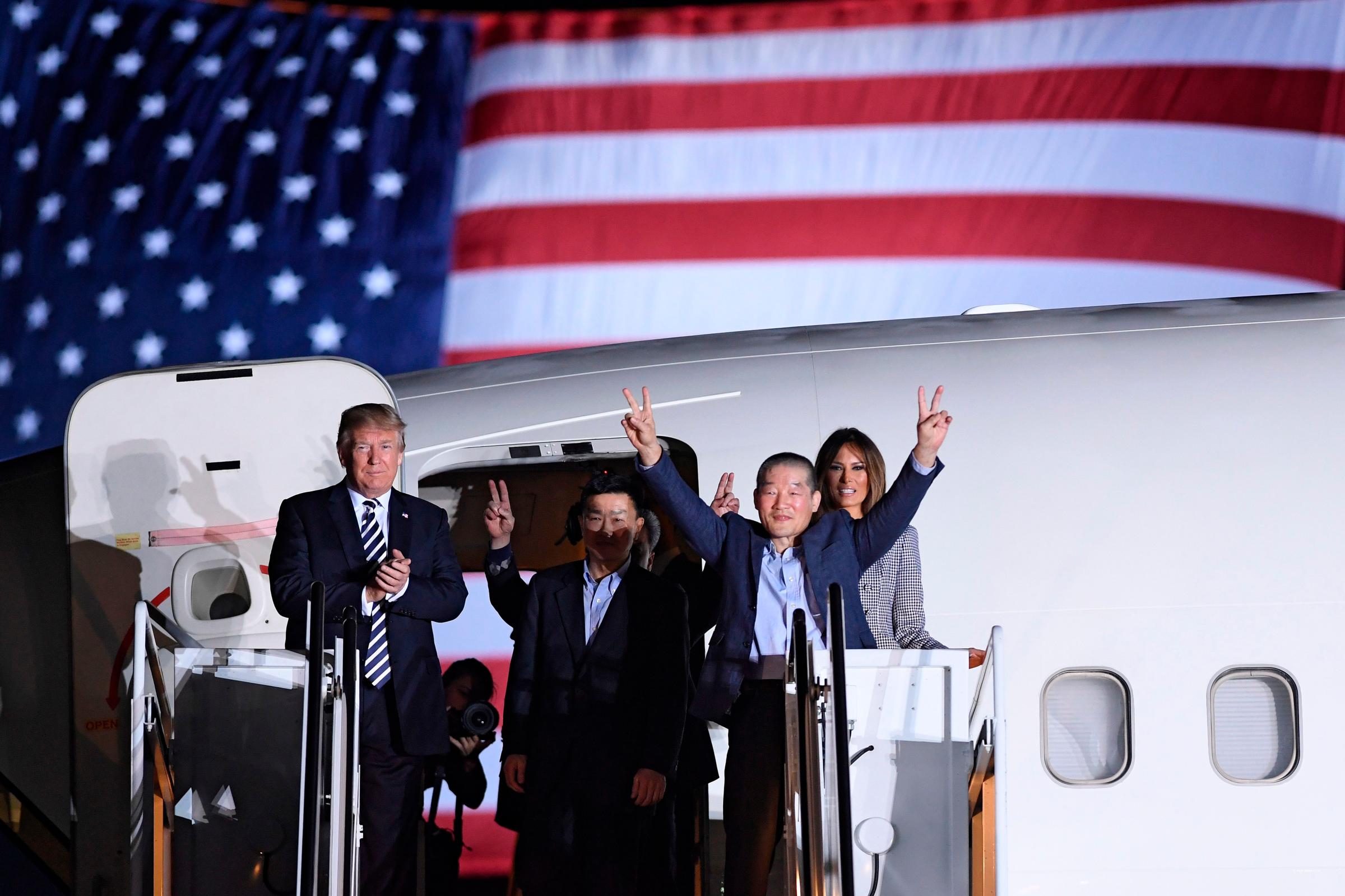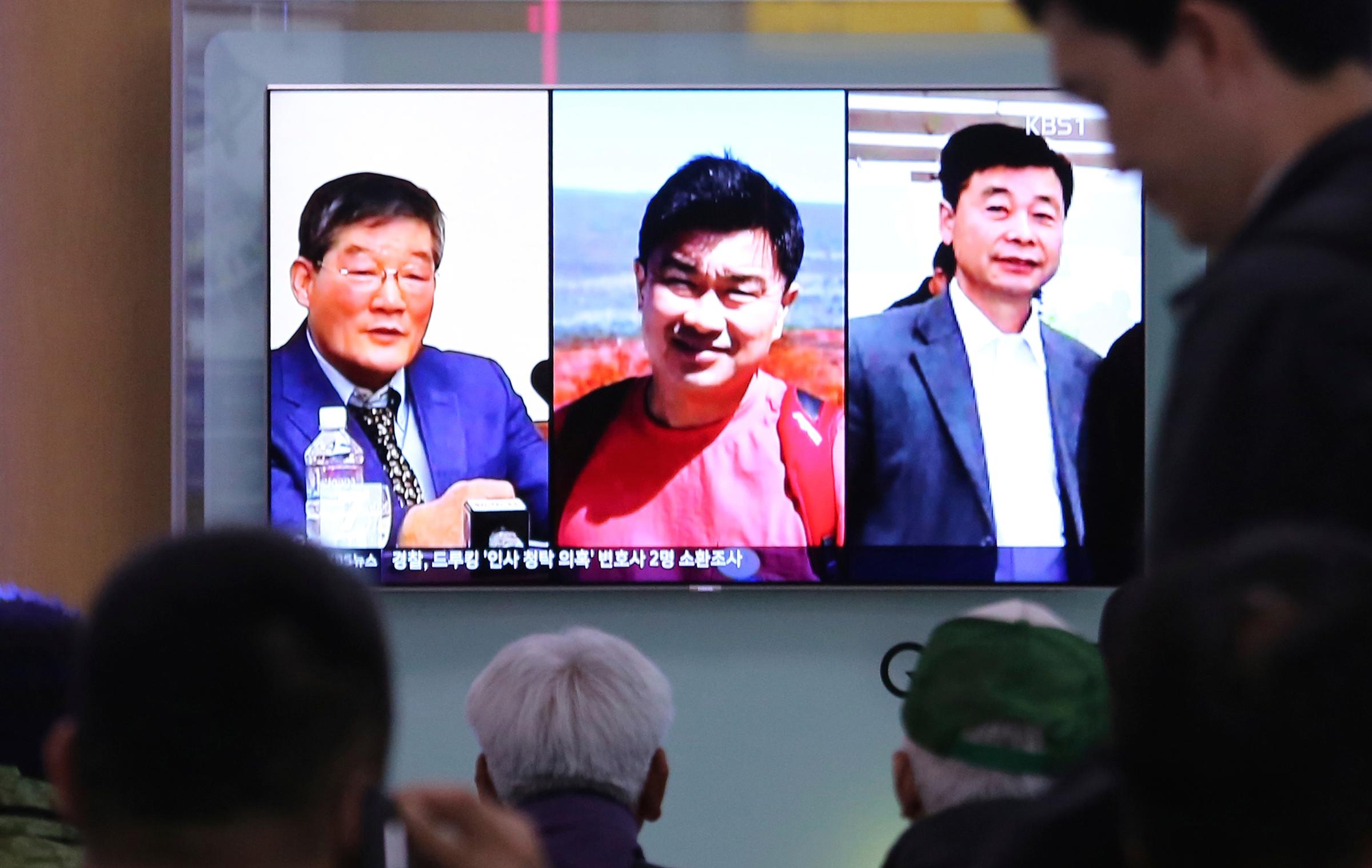About an hour before Secretary of State Mike Pompeo’s plane took off from the North Korean capital Wednesday night, three Americans, Kim Hak Song, Tony Kim and Kim Dong Chul, were given back their freedom. Their release following more than a year in the country’s secretive prisons marked a significant diplomatic détente as Pompeo lays the groundwork for a forthcoming summit between President Donald Trump and North Korean leader Kim Jong Un.
The release of American prisoners, which Pyongyang has been accused of using as political bargaining chips, has been a priority of the White House as it moves for more engagement with the Kim regime. But the last time North Korea freed a detained U.S. citizen, in June 2017, what almost looked like an act of good faith took a sudden and sinister turn; Otto Warmbier, by then a 22-year-old college student, died within a week of returning to his hometown of Cincinnati, Ohio in a coma.
Read more: Kim Jong Un Begins ‘Writing a New History’ as the First North Korean Leader to Visit the South
The three detainees who have just been released landed early Thursday morning at Joint Base Andrews near Washington, D.C., where they were greeted by President Trump, First Lady Melania Trump, Vice President Mike Pence and his wife, Karen Pence. Throughout two flights they took to get home from the North Korean capital, they reportedly remained sequestered from contact beyond a team of medical professionals, including a psychiatrist. The State Department discussed only the most basic details about them, according to the Associated Press, and little is yet known about their health status. All three walked across the tarmac in Pyongyang before boarding, and off a medical plane upon their arrival in the U.S.
Who are these three Americans, who lost more than a year of their lives in detention? What did they do, and why were they taken prisoner? Here’s what we know about Kim Hak Song, Tony Kim and Kim Dong Chul.
Kim Hak Song
Authorities are believed to have arrested Kim Hok Song, who was in North Korea for several weeks working at the Pyongyang University of Science and Technology (PUST), as he was about to leave the country on May 6, 2017. The Korean Central News Agency (KCNA) reported his arrest for “hostile acts” toward the state, but offered no details about his age, occupation or alleged crime.
The university said in a statement that Kim, also known by the Chinese version of his name Jin Xue Song, was apprehended after concluding a trip to carry out “agricultural development work” at the school’s “experimental farm.” Kim was the second American staffer at the school to be arrested last year after his colleague, Tony Kim, was apprehended in April. It is unclear what, if any, connection the two prisoners may have had with each other.

North Korea’s first private university, PUST was founded and remains operated by actors outside the country, mostly Evangelical Christian organizations. While it is a secular school — North Korea keeps a tight grip on information about religion — the university chiefly employs Christian staff. The school has close historical ties to Yanbian University in Jilin, China, near the border with North Korea. Tony Kim reportedly worked as a professor there, while Kim Hak Song is believed to have studied and perhaps worked at the school. Representatives of PUST have stated that the arrests of Tony Kim and Kim Hak Song are “not connected in any way” with the university’s work.
Born in Jilin and educated mostly in California, Kim was an ethnic Korean who is believed to have emigrated to the U.S. in the mid-1990s, according to CNN. Citing two men who said they studied with him in the U.S., CNN reports that Kim likely became a citizen in the 2000s, then later moved back to China. His classmates described him as a proud Korean with a passion for issues related to food security and agriculture. “North Korea is persecuting their savior, a person who came to help them. This is wrong,” David Lee, one of the men who said he studied with Kim, told CNN.
Tony Kim
Tony Kim, also known by his Korean name Kim Sang Duk, was also a teacher at PUST. Few further details are known about the man, believed to be in his 50s, who was abducted at the airport in Pyongyang while trying to leave the country on April 22, 2017. Reports in Korean state media did not specify the allegations against him. Upon his arrest, PUST issued a statement that his detention was “related to an investigation into matters not connected in any way with the work of PUST,” and that “life on campus and the teaching at PUST is continuing as normal.” (An almost identical statement was released in response to his colleague’s arrest.)
Read More: Jailed U.S. Reporters: Business As Usual for North Korea
The chancellor of the university, Chan-Mo Park, told the New York Times that Kim was involved in some extracurricular activities, such as volunteering at an orphanage. According to the Times, Kim most recently lived in North Korea with his wife, who may still be in the country. Citing the prisoner’s Facebook page, the Times reports that Kim studied accounting at the University of California, Riverside and Aurora University, and spent about a decade working as an accountant in the U.S. before returning to Asia.

Kim Dong Chul
South Korea-born Kim Dong Chul, 62, was arrested in Oct. 2015 on charges of espionage and other undisclosed crimes. Kim is a naturalized U.S. citizen and resident of Fairfax, Va., who ran a trade and hotel services firm in the special administrative zone between China and the DPRK. His secretive detention was only brought to public attention about three months later, when authorities decided to introduce the prisoner to a CNN crew visiting Pyongyang. He was convicted in March 2016 and sentenced to 10 years hard labor, about a week after Warmbier’s conviction — both sentences were handed down shortly after the U.S. had levied steeper sanctions against North Korea in response to missile testing.
Kim also delivered a public confession and apology, wherein he said that in 2013 he began spying on behalf of “South Korean conservative elements,” the New York Times reported at the time. The North Korean government reportedly arranged a limited press conference that was covered by South Korea’s Yonhap News Agency and China’s state-run Xinhua. The few reports about the conference said he admitted to bribing North Korean residents for information about Pyongyang’s nuclear weapons program.
More Must-Reads from TIME
- Inside Elon Musk’s War on Washington
- Meet the 2025 Women of the Year
- The Harsh Truth About Disability Inclusion
- Why Do More Young Adults Have Cancer?
- Colman Domingo Leads With Radical Love
- How to Get Better at Doing Things Alone
- Cecily Strong on Goober the Clown
- Column: The Rise of America’s Broligarchy
Contact us at letters@time.com